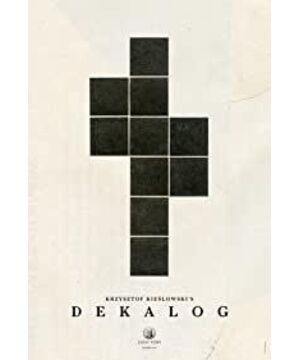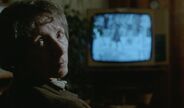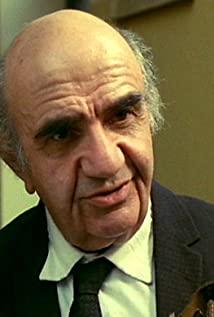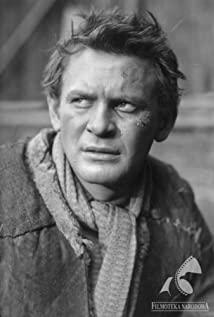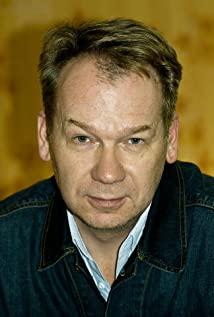This is the last story of the "Ten Commandments" series. In the film, we have seen many responses and new attempts, but without exception, it still continues its questioning attitude on the predicament of existence, "We are our own passions. Prisoners of , physical conditions and biological phenomena. We are constantly trying to find a way out for ourselves, but are forever imprisoned by our own passions and feelings." These were words before the script for the first story of the Ten Commandments, but they are in this series The last story of the 10th Commandment is used as a point of reference, so that the whole story of the Ten Commandments is brought together here, each of which tells about one or more of the commandments, but the morals and ethics they reveal as a whole. The predicament is all penetrated by the "prisoner" situation.
The story begins with the death of an old man who appears twice in the eighth story, where he triumphantly shows Professor Sophia his newly acquired stamp collection, and at the beginning of the episode, he Already lying quietly in the coffin, the film does not explain how long after his death he was discovered. One detail is that the goldfish he raised all starved to death and began to rot.
Such a way of dying alone often makes people think that this is a lonely and single old man, but in fact, he has a family and has two sons - Jerzen and Artur. Their relationship was revealed one by one. When the funeral was over, the two went to the old man's residence to pack up, but got lost in front of the building where his father lived. security door lock.
We know from the conversations of Yelzen and Arthur that the root cause of this alienation is that they do not understand why the father is so possessive of a thing. Comment on him: He gave his family, career, and even love to this; respectable passion. His collection may fill a void, but once the hobby begins to affect families and relationships, it becomes a dilemma and struggles for those in it.
It is clear that the film starts with the side effects of "desire" and "passion". Due to the different attitudes held by different people, a simple hobby has evolved into an ethical discussion, which will appear later in the film. The plot between Yerzen and his wife affected the family because of this desire, and in the previous film "Movie Madness", there was also a situation where the protagonist was at odds with his wife because of hobbies. Through these groups of characters, Kieslowski repeatedly emphasizes the general confusion caused by the desire to focus, but in this story he does not comment on the focus itself, the old man is not portrayed as the kind of lost The pervert in a state of madness, on the contrary, there are several details in the film, all of which point to the old man's emphasis on family, such as his careful collection of various newspaper clippings performed by his younger son, and the passage of Professor Sophia in episode 8. He mentioned that in addition to stamps, he also likes to show pictures of his grandson to others. These details reflect the old man's attitude towards his family and his desire to understand his family. As for why not to resist the desire itself, this is exactly the root cause of the predicament. As Keith said, for the Ten Commandments of the Ten Commandments, the probability of people violating it is far greater than people's doubts about it. In short After all, everyone knows not to kill people, but people are killed every day. In what form does desire appear and sneak into people's hearts, so that people don't realize it. This is the proposition that the film will discuss next.
The vast majority of collectors die in apprehension, because each of them has the same apprehension that future generations will inherit those collections, but not their unprecedented passion, and ultimately lead to hard-earned collections Disappearing after death, Jerzen and Artur are the worryingly lacking passion for the elderly, and until the death of their father, they also failed to understand why his father was so "possessive", those who For their brothers, the stamps only represent a more practical item that can be replaced. In addition, at this moment, someone found them with the 220,000 IOUs owed by the old man, so the sons naturally moved to sell the stamps. idea.
Arthur took the stamps to appraise the value, and he met the "chairman" who presided over the funeral for his father. Here, his sincere feelings and respect for the old man were shown. They were not empty words in the eulogy, but real Respect, in the face of such a valuable collection, he did not take advantage of the opportunity to deceive the layman, but frankly told him that this batch of stamps was worth nearly 200 million, and gave them advice when leaving: wasting one person for three Ten years of life, would be a crime, even though it's just a father's way of life that you don't know, too.
The next episode became dramatic. After learning the real value of the stamps, the two brothers were not in a hurry to sell them. They agreed to keep the stamps, and then sold the property to help their father pay off the debt. The eldest son, Yell Cen even went to the old man's residence in the middle of the night and began to study his father's philatelic notes. Jelzen found out that his father had a set of Mercury stamps that was the only one in Poland, but this set of three stamps was missing the red one. The two brothers were troubled by this. At this time, they had cheated them three times before." The stamp dealer of the "Led Zeppelin" stamps found it and provided the whereabouts of the red Mercury. This is a multi-party transaction, and the owners of the things they own are only exchanged but not sold. The stamp dealer has one that the owner of "Red Mercury" wants. Stamps, but if the brothers wanted the stamps, they would need to exchange for a kidney, which the stamp dealer will use to save their 16-year-old daughter.
Through the blood type test, Yerzen's kidney was eligible for transplantation. He hesitated for a moment, but Arthur was very agitated by the side, and then he quickly agreed. But when he got off the operating table, his younger brother told him that someone had ransacked his father's apartment while he was operating and stole the entire collection. They lost nearly 200 million of their property, and the eldest even lost his kidney, but in the end there was only a "red Mercury" left in his hand. Such an accident made the two brothers suspicious of each other for a moment, but soon The smoke disappeared.
The film's last two brothers went to the stamp market at the same time and bought newly released stamps, although this was insignificant in terms of collectible value, but for them, it hinted at the beginning of a new round of desire, and they began to become passionate about stamps.
This story ends in such an almost dark humorous way. As the final chapter of the whole film, there are still only questions about the predicament, but no answers to the questions, but as a complete series of the Ten Commandments, this ending is not a full stop, but a All the previous stories complete an echo of the commandment, which also goes back to the first commandment: Thou shalt not have other gods. The uniqueness of God can be understood here as the uniqueness of the answer, but the uniqueness of the answer does not refer to its universal applicability, but because of its individuality, it is the only answer that exists in different individuals. From this we can see that Kieslowski is so serious in telling us the story of the Ten Commandments, but his intention is to express that the commandments (or all other regulations) themselves are unreliable, and the decision of any question is in the end. It is all specific to the individual, and God is powerless, so if there is a one God, then he is not God, but ourselves.
View more about Dekalog reviews


